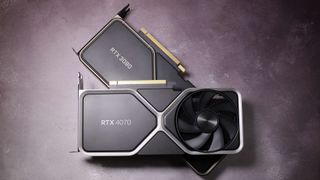FSR 3 removed from Nightingale's launch plan with 'a significant number' of game crashes blamed on the AMD tech 'whether or not users had the setting turned on'
The bug affected everyone but Radeon owners are the ones left paying the price.

Nightingale, the latest hit in the sea of co-op survival games, has been running into a number of problems in its recent server stress test. That's par for the course of any online beta, but the developers noticed something very specific about a significant number of the crashes recorded: No matter whether it was enabled or not, the implementation of AMD's FSR 3 upscaling tech was apparently to blame. With the official launch happening tomorrow, the developers were left with only one choice and that was to yank the code right out.
You might not think this is such a big deal, and if you have an Intel Arc or Nvidia GeForce graphics card, it isn't, as their XeSS and DLSS upscalers don't appear to be causing any issues. However, Nightingale's overall performance is rather dependent on the use of upscaling technology, as indicated by the game's system requirements.
The removal of FSR 3 leaves AMD Radeon owners with two other upscaling options: Intel's XeSS (unless it's the Arc-specific implementation) and Unreal Engine 5's own TSR system. I've not checked out Epic's upscaler myself recently, though I did play about with it a while back and noticed that the edges of objects had a habit of flickering about at times. Whether that's the case in Nightingale isn't clear, though I can't imagine many gamers would choose to use it over XeSS.
Inflexion Games, the developers of Nightingale, has said it's hoping to get FSR3 back into the game in the future (via Videocardz), perhaps using an older version of the technology. I'm not aware of any other game with FSR 3 experiencing the same problems, so this is likely an implementation problem and not a fault of the technology itself.
In the meantime, the team has apparently updated its performance expectations blog to reflect his change. Well, it says it has, but I'll be damned if I can see any updates or changes to the performance figures in the system requirements, from looking at the Wayback Machine it doesn't look like it's been changed since early Feb.

Best CPU for gaming: The top chips from Intel and AMD.
Best gaming motherboard: The right boards.
Best graphics card: Your perfect pixel-pusher awaits.
Best SSD for gaming: Get into the game ahead of the rest.
But I can guess what the removal of FSR 3 is going to be like for Radeon owners hoping to enjoy a spot of Victorian-era-styled survival crafting without any kind of upscaling or frame generation, and that's slooooow.
Unless you turn down various settings, of course. The main three to focus on will be resolution, shadow quality, and global illumination.
The biggest gaming news, reviews and hardware deals
Keep up to date with the most important stories and the best deals, as picked by the PC Gamer team.
Unreal Engine 5 can produce spectacular visuals with the lighting cranked up but it seriously loads up the GPU. Even the best AMD Radeon graphics cards can struggle with it, so the loss of AMD's own upscaling feature isn't going to help matters.
Games in Early Access frequently have all kinds of performance issues or game-breaking bugs, but I can't help but feel that if Inflexion Games had done its server stress test earlier than the beginning of this month, the developers may have had sufficient time to resolve the FSR3 problem in time for launch.

Nick, gaming, and computers all first met in 1981, with the love affair starting on a Sinclair ZX81 in kit form and a book on ZX Basic. He ended up becoming a physics and IT teacher, but by the late 1990s decided it was time to cut his teeth writing for a long defunct UK tech site. He went on to do the same at Madonion, helping to write the help files for 3DMark and PCMark. After a short stint working at Beyond3D.com, Nick joined Futuremark (MadOnion rebranded) full-time, as editor-in-chief for its gaming and hardware section, YouGamers. After the site shutdown, he became an engineering and computing lecturer for many years, but missed the writing bug. Cue four years at TechSpot.com and over 100 long articles on anything and everything. He freely admits to being far too obsessed with GPUs and open world grindy RPGs, but who isn't these days?
Most Popular






